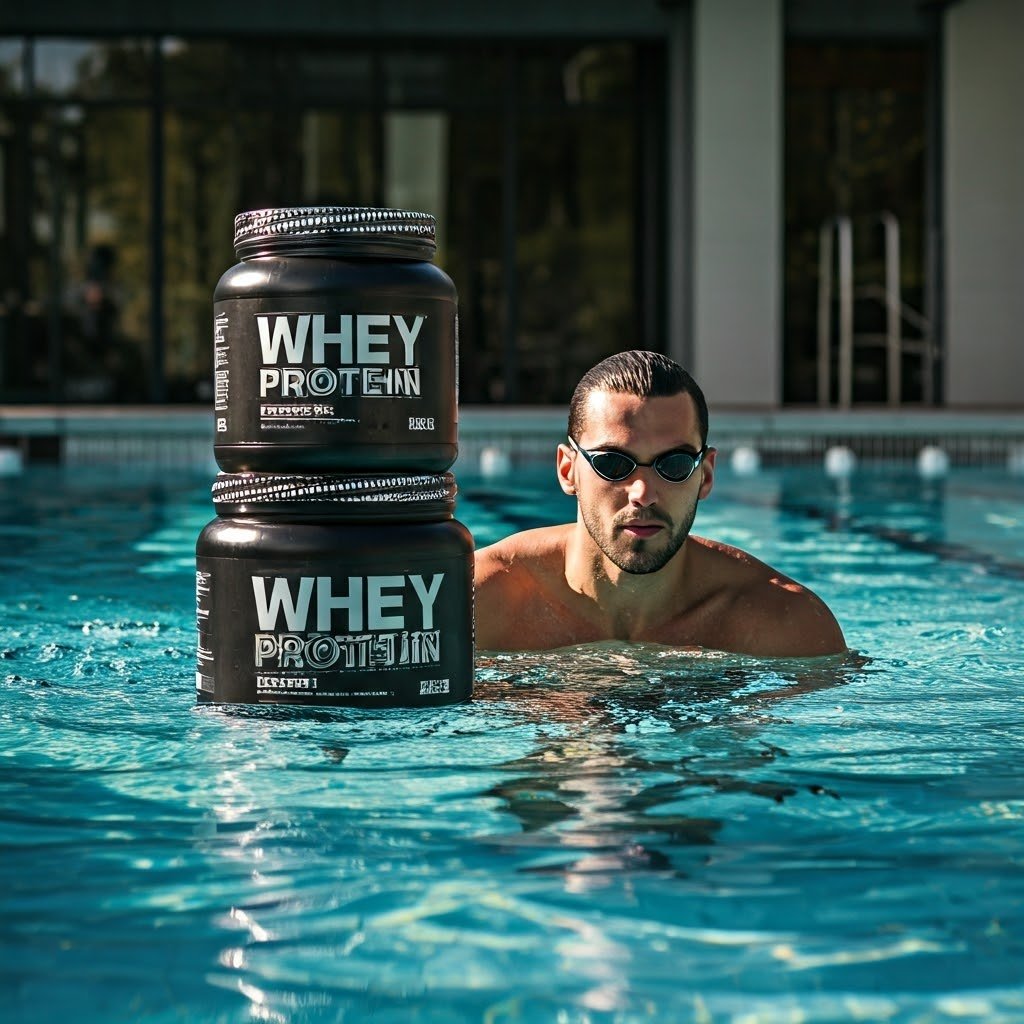
7 points Effect of Whey Protein on Swimmers
- Children’s illustration – A French Creative Life - March 24, 2025
- Caught by Collagraphs – A French Creative Life - March 24, 2025
- Develop Excel Skills From Basics to AI Integration With This $35 Course Bundle - March 24, 2025
Whey protein is a high-quality, fast-digesting protein derived from milk during the cheese-making process. It is widely used by athletes, including swimmers, to support muscle growth, repair, and overall performance. Below, we’ll discuss its effects on swimmers in detail, focusing on both short- and long-term benefits, potential side effects, types of whey protein, its nutritional value, and the best time to consume it.
Short-Term Benefits of Whey Protein for Swimmers
- Muscle Repair and Recovery:
Swimmers undergo intense training that puts stress on their muscles. Whey is rich in essential amino acids, particularly leucine, which plays a crucial role in muscle protein synthesis. Consuming whey protein after swimming can help repair muscle tissue and reduce soreness, leading to faster recovery. - Enhanced Endurance:
The amino acids in whey protein help improve endurance by preventing muscle breakdown during prolonged exercise. Swimmers who consume whey protein may experience improved stamina in both training and competition. - Boosts Immune Function:
Intense exercise, such as swimming, can suppress the immune system temporarily. Whey protein contains immunoglobulins and lactoferrin, which help support immune function, reducing the risk of illness after intense training periods. - Hydration Support:
Whey protein, especially in shakes, often contains a small amount of electrolytes like sodium and potassium, which can help replenish lost nutrients after a swimming session, promoting optimal hydration.
Long-Term Benefits of Whey Protein for Swimmers
- Muscle Mass Maintenance and Growth:
Consistent whey protein intake over time aids in maintaining lean muscle mass. This is particularly important for swimmers who need strength and power for sprints, as well as endurance for long-distance events. Protein supplementation can lead to improved muscle growth when combined with a strength training programme. - Improved Recovery Time:
Long-term consumption of whey protein enhances muscle recovery after intense sessions. Over time, swimmers may experience less muscle soreness and quicker recovery periods between training sessions, allowing for more frequent and intense workouts. - Increased Metabolic Rate:
Protein, especially whey protein, can increase the thermic effect of food (TEF), which is the energy expended in digesting and metabolising food. Swimmers who include whey protein in their diet may experience a slight boost in metabolism, supporting fat loss and improved body composition. - Stronger Bones and Joints:
Swimmers often experience repetitive stress on their joints and bones due to the nature of their sport. Whey protein contains bioactive peptides that may contribute to bone health, improving joint function and reducing the risk of injury over time.
Potential Side Effects of Long-Term Whey Protein Use
While whey protein is generally safe for most people, long-term or excessive use may have some side effects:
- Kidney Strain:
In individuals with pre-existing kidney conditions, excessive protein intake can put extra strain on the kidneys. While this is not a concern for healthy swimmers, it is important to consume whey protein in moderation and not exceed the recommended daily protein intake. - Digestive Issues:
Some swimmers may experience bloating, gas, or diarrhoea due to the lactose content in whey protein. Those who are lactose intolerant may struggle with whey protein concentrate, which contains higher amounts of lactose. This can be mitigated by choosing whey protein isolate, which has lower lactose content. - Nutrient Imbalance:
Over-relying on whey protein as a primary source of nutrition can lead to an imbalance in the diet. It’s important for swimmers to ensure they are getting a well-rounded diet with adequate carbohydrates, fats, vitamins, and minerals to support overall health. - Potential Allergies:
Some individuals may be allergic to milk proteins, and consuming whey protein can lead to allergic reactions like rashes, itching, or more severe symptoms. People with milk allergies should avoid whey protein and opt for plant-based alternatives.
Types of Whey Protein
- Whey Protein Concentrate (WPC):
Whey protein concentrate is the least processed form of whey protein, containing around 70–80% protein by weight. It retains more of the beneficial nutrients found in whey, such as lactose, fats, and carbohydrates. However, it may cause digestive discomfort for those who are lactose intolerant. - Whey Protein Isolate (WPI):
Whey protein isolate is more refined than concentrate, containing up to 90% protein by weight. It has a lower lactose and fat content, making it a better option for individuals who are lactose intolerant or those looking to reduce fat intake. - Whey Protein Hydrolysate (WPH):
Whey protein hydrolysate is pre-digested, meaning it’s broken down into smaller peptides for faster absorption. This makes it ideal for those who want a quick-digesting protein. It is often used by athletes for rapid recovery but tends to have a bitter taste.
Nutritional Value of Whey Protein
Whey protein is highly nutritious and contains all the essential amino acids required for muscle repair, growth, and overall health. Below is a typical breakdown of the nutritional profile of 1 scoop (about 30 grams) of whey protein concentrate:
- Calories: 120–130 kcal
- Protein: 20–25 grams
- Carbohydrates: 3–5 grams (depending on the type)
- Fats: 1–3 grams
- Sugar: 1–2 grams (mainly from lactose in whey concentrate)
- Vitamins and Minerals: Small amounts of B vitamins, calcium, potassium, and magnesium
- Amino Acids: Contains all essential amino acids, with high levels of leucine, which is crucial for muscle protein synthesis.
Whey Protein: Before or After Swimming?
The best time to consume whey protein depends on the swimmer’s training goals:
- After Swimming:
Consuming whey protein after swimming is generally recommended to enhance muscle recovery. After an intense swim, your muscles need protein to repair and grow. Whey protein is digested and absorbed quickly, making it ideal for post-exercise recovery. It can also help replenish glycogen stores when combined with carbohydrates. - Before Swimming:
Whey protein can also be consumed before swimming, especially if a swimmer needs a protein boost to prevent muscle breakdown during a long training session. However, consuming a small meal that includes protein and carbohydrates 1–2 hours before swimming is often recommended rather than an immediate whey protein shake.
What Whey Protein Does to the Body
Whey protein has a variety of effects on the body, particularly for athletes like swimmers:
Whey protein can have numerous benefits for swimmers, from enhancing muscle recovery and growth to supporting endurance and immune function. While it is generally safe, swimmers should be mindful of potential digestive issues and kidney strain with excessive consumption. The best type of whey protein (concentrate, isolate, or hydrolysate) depends on the individual’s dietary needs, and the optimal time to consume it is generally post-swimming to support recovery.











Leave a Reply